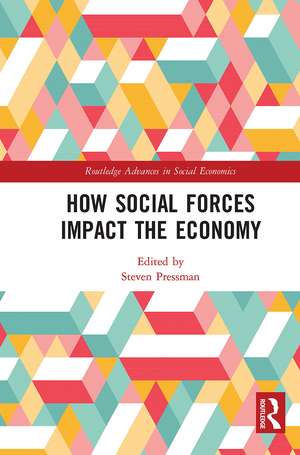How Social Forces Impact the Economy: Routledge Advances in Social Economics
Editat de Steven Pressmanen Limba Engleză Paperback – feb 2022
This book argues that adopting a truly social approach to economics opens the door to studying how people form preferences, and how they learn by taking cues from others about how to behave and what to consume. Each chapter contributor works to highlight the breadth of new insights and possibilities that emerge from a fuller understanding of social economics. Part I focuses on microeconomics, bringing individual behaviors and individual entrepreneurs into a more social context. Part II focuses on macroeconomic topics, such as how money and quasi-monies (like Bitcoins) are social, how money developed as a social institution, and how social forces matter for economic development. Finally, Part III looks at the consequences of considering social factors when it comes to policy: environmental policy, industrial policy, and policies promoting greater equality.
This book is invaluable reading to anyone interested in the relationship between economics and sociology, how social forces affect policy effectiveness, human behavior, and the overall economy.
| Toate formatele și edițiile | Preț | Express |
|---|---|---|
| Paperback (1) | 378.80 lei 43-57 zile | |
| Taylor & Francis – feb 2022 | 378.80 lei 43-57 zile | |
| Hardback (1) | 983.38 lei 43-57 zile | |
| Taylor & Francis – 23 iun 2020 | 983.38 lei 43-57 zile |
Din seria Routledge Advances in Social Economics
-
 Preț: 641.33 lei
Preț: 641.33 lei -
 Preț: 386.77 lei
Preț: 386.77 lei -
 Preț: 310.08 lei
Preț: 310.08 lei - 18%
 Preț: 981.91 lei
Preț: 981.91 lei -
 Preț: 389.27 lei
Preț: 389.27 lei -
 Preț: 456.77 lei
Preț: 456.77 lei -
 Preț: 413.31 lei
Preț: 413.31 lei -
 Preț: 481.07 lei
Preț: 481.07 lei -
 Preț: 279.96 lei
Preț: 279.96 lei -
 Preț: 481.07 lei
Preț: 481.07 lei -
 Preț: 382.87 lei
Preț: 382.87 lei -
 Preț: 463.44 lei
Preț: 463.44 lei - 17%
 Preț: 222.06 lei
Preț: 222.06 lei -
 Preț: 478.02 lei
Preț: 478.02 lei -
 Preț: 479.27 lei
Preț: 479.27 lei -
 Preț: 408.71 lei
Preț: 408.71 lei - 18%
 Preț: 985.71 lei
Preț: 985.71 lei -
 Preț: 461.48 lei
Preț: 461.48 lei - 15%
 Preț: 418.48 lei
Preț: 418.48 lei -
 Preț: 460.52 lei
Preț: 460.52 lei - 17%
 Preț: 257.68 lei
Preț: 257.68 lei - 17%
 Preț: 269.39 lei
Preț: 269.39 lei - 13%
 Preț: 337.39 lei
Preț: 337.39 lei - 15%
 Preț: 420.83 lei
Preț: 420.83 lei -
 Preț: 440.02 lei
Preț: 440.02 lei -
 Preț: 441.89 lei
Preț: 441.89 lei -
 Preț: 377.84 lei
Preț: 377.84 lei - 18%
 Preț: 1364.18 lei
Preț: 1364.18 lei - 18%
 Preț: 1042.36 lei
Preț: 1042.36 lei
Preț: 378.80 lei
Nou
Puncte Express: 568
Preț estimativ în valută:
72.49€ • 75.52$ • 60.27£
72.49€ • 75.52$ • 60.27£
Carte tipărită la comandă
Livrare economică 10-24 februarie 25
Preluare comenzi: 021 569.72.76
Specificații
ISBN-13: 9781032235684
ISBN-10: 1032235683
Pagini: 244
Ilustrații: 22 Illustrations, black and white
Dimensiuni: 156 x 234 x 13 mm
Greutate: 0.35 kg
Ediția:1
Editura: Taylor & Francis
Colecția Routledge
Seria Routledge Advances in Social Economics
Locul publicării:Oxford, United Kingdom
ISBN-10: 1032235683
Pagini: 244
Ilustrații: 22 Illustrations, black and white
Dimensiuni: 156 x 234 x 13 mm
Greutate: 0.35 kg
Ediția:1
Editura: Taylor & Francis
Colecția Routledge
Seria Routledge Advances in Social Economics
Locul publicării:Oxford, United Kingdom
Public țintă
Postgraduate and UndergraduateCuprins
1. Introduction: Putting the Social Back into Economics Part I: Individual Behavior 2. Becker’s Two Models of Social Interaction 3. Greed, Need and Solidarity: The Socialization of Homo Economicus 4. The Burden of Knowledge and Schumpeter’s Innovation Part II: Macroeconomics and Money 5. Money as Social Institution: Its Historical Emergence and Political Implications 6. A Closer Look at the Promise of the Blockchain in Banking and Biobanking 7. When the Cultural Argument Goes too Far: The Need to Limit Particularism and Welcome Convergence on Socially Progressive Goals Part III: Policy Issues 8. Industrial Policy and Societal Goals: A New Look at the American Case (from Hamilton to Obama and Trump) 9. Relational Determinants of International Environmental Cooperation: A Panel Analysis 10. Explaining Inequality: Facts are No Longer Enough
Notă biografică
Steven Pressman is Professor of Economics at Colorado State University, USA, and Emeritus Professor of Economics and Finance at Monmouth University, USA.
Descriere
How Social Forces Impact the Economy demonstrates that a broader conception of social economics provides for a better understanding of how economies work. It argues that adopting a social approach opens the door to studying how people learn by taking cues from others about what to consume.
